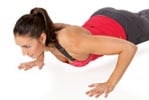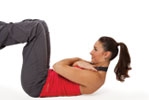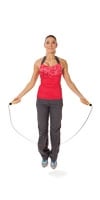
Boot camp classes aren't taught by yelling drill-sergeant instructors. Don't be scared to step forward and learn about boot camp basics.
Boot camp classes aren't taught by yelling drill-sergeant instructors. Don't be scared to step forward and learn about boot camp basics.
The popularity of boot camp classes has exploded in the past few years, and they are now a mainstay in many gyms. Fitness boot camps became famous after they were featured on weight-loss reality shows, but because of their effectiveness they have become popular with the general public. Not sure if boot camp classes are for you? Read on.
Getting back to basics
Both indoor and outdoor boot camp classes include old-fashioned calisthenics such as jumping jacks and sit-ups, exercises that use more than one muscle group. Generally, you aren’t required to bring your own equipment.
If the class is outdoors, the instructor makes use of the environment, such as park benches or steps. An indoor class likely involves equipment provided by the gym, such as exercise mats or weights.
Functioning better
Unlike other kinds of fitness classes, boot camps combine muscle building with aerobic exercise to give you a full-body workout. According to YMCA group fitness director Christopher Rumary: “This killer combination means one thing: well-rounded functional fitness.”
Functional exercises work several muscle groups. They make you stronger overall so you can do everyday things such as carrying the groceries or bending down to pick something up without hurting your back.
Having fun
Although they’re tough, boot camp workouts can still be fun. Rumary says, “One of the great things about a boot camp class is the variety of exercises, movements, and drills you can experience.”
Another great thing for many people is the camaraderie and support offered by fellow participants. Working out with a group can keep you accountable and motivated.
Getting results
Most importantly, boot camps work. They provide interval training, which involves doing a full-body exercise in a short intense burst and then recovering at a lower intensity. The benefits of this kind of training include burning more calories and improving respiratory function, which translate into greater weight loss and better performance.
A 2008 study found that a boot camp class burns 9.8 calories per minute. That adds up to 588 calories in a 60-minute class.
Whether you want to lose that extra 10 pounds or get your body in tip-top shape, a fitness boot camp can help you get fit while keeping you so busy you forget how hard you’re working.
4 boot camp exercises to try at home
The good thing about many boot camp exercises is that they don’t require much space or equipment and can be done in your living room. Classic calisthenics are great for fitness and can be worked into a busy day.
Push-ups

Squat thrusts (aka burpees)

Start in a standing position with feet together. Squat and put your palms on the floor just in front of your feet. Jump your feet back into the push-up position. Pause and then jump back into a squat with your hands still on the floor. Leap up and lift your arms over your head. For a more challenging variation, do a push-up before jumping back into the squat position.
Sit-ups

Jumping rope

Calories burned during various exercises
The number of calories burned depends on factors such as body weight, metabolism, fitness level, and the intensity of the exercise. A heavier person will burn more calories.
| Activity | Calories burned per hour for a 155 lb (70 kg) person |
| stretching | 281 |
| weightlifting, vigorous | 422 |
| calisthenics such as push-ups, sit-ups, and squat thrusts | 563 |
| martial arts | 704 |
| boxing | 800 |
| jumping rope (fast paced) | 844 |
| running (8-minute mile) | 880 |
| running up stairs | 1,056 |
What to consider when choosing a boot camp
Indoors or outdoors
Will you want to get out of bed to do squat thrusts in the rain or cold? Bad weather might keep you from working out regularly.
Equipment
Are you required to bring equipment such as weights or exercise mats? Having to carry 5- or 10-lb weights might make it difficult if you take public transit, for example.
Class size
What is the teacher/student ratio? According to Rumary, 12 to 16 students is ideal. “This number provides a great small group dynamic, and allows your instructor to engage you personally and ensure you are performing the exercises safely.”
Level of difficulty
Is the class suitable for beginners? Ask if the instructor can accommodate participants of all fitness levels.
The fine print
Does the company have a refund policy? What’s the expectation concerning attendance and lateness? For example, if you arrive late to a class, will you have to do 20 push-ups as a punishment?




